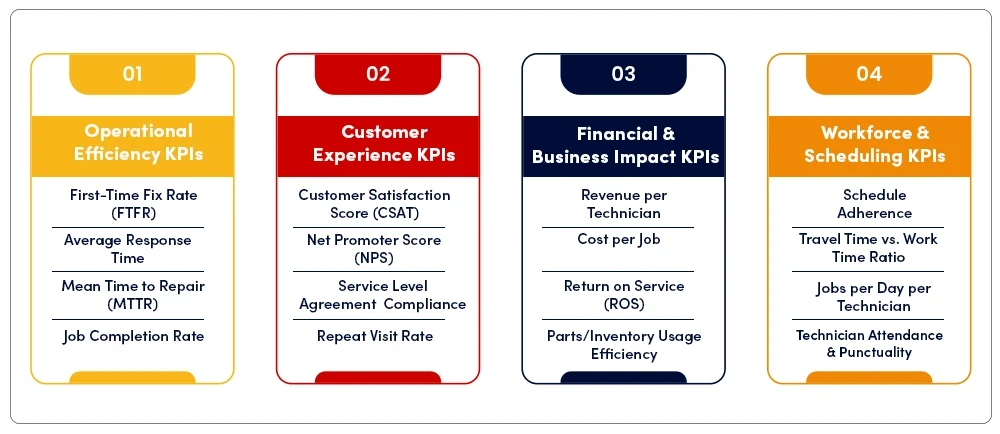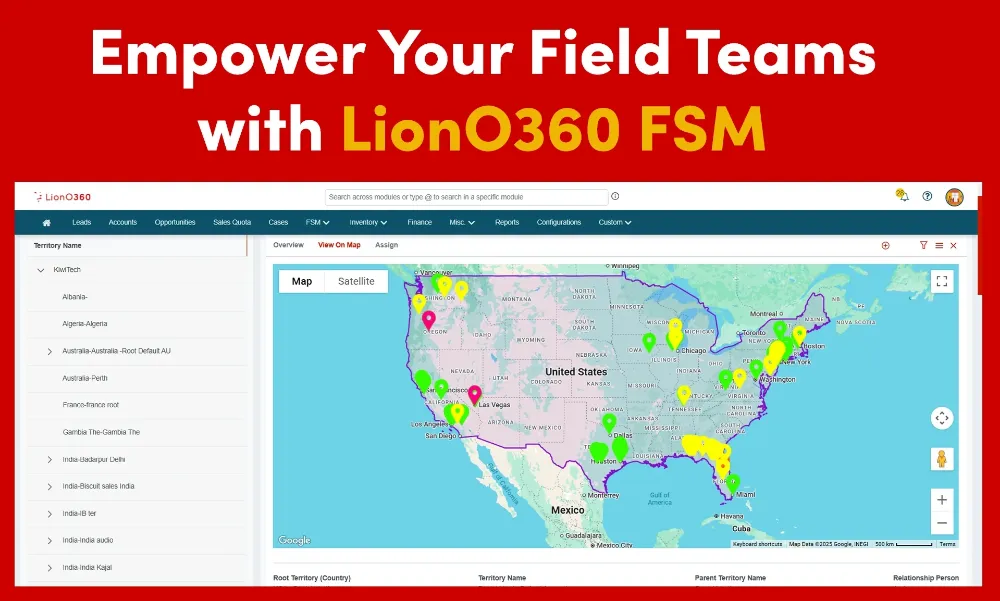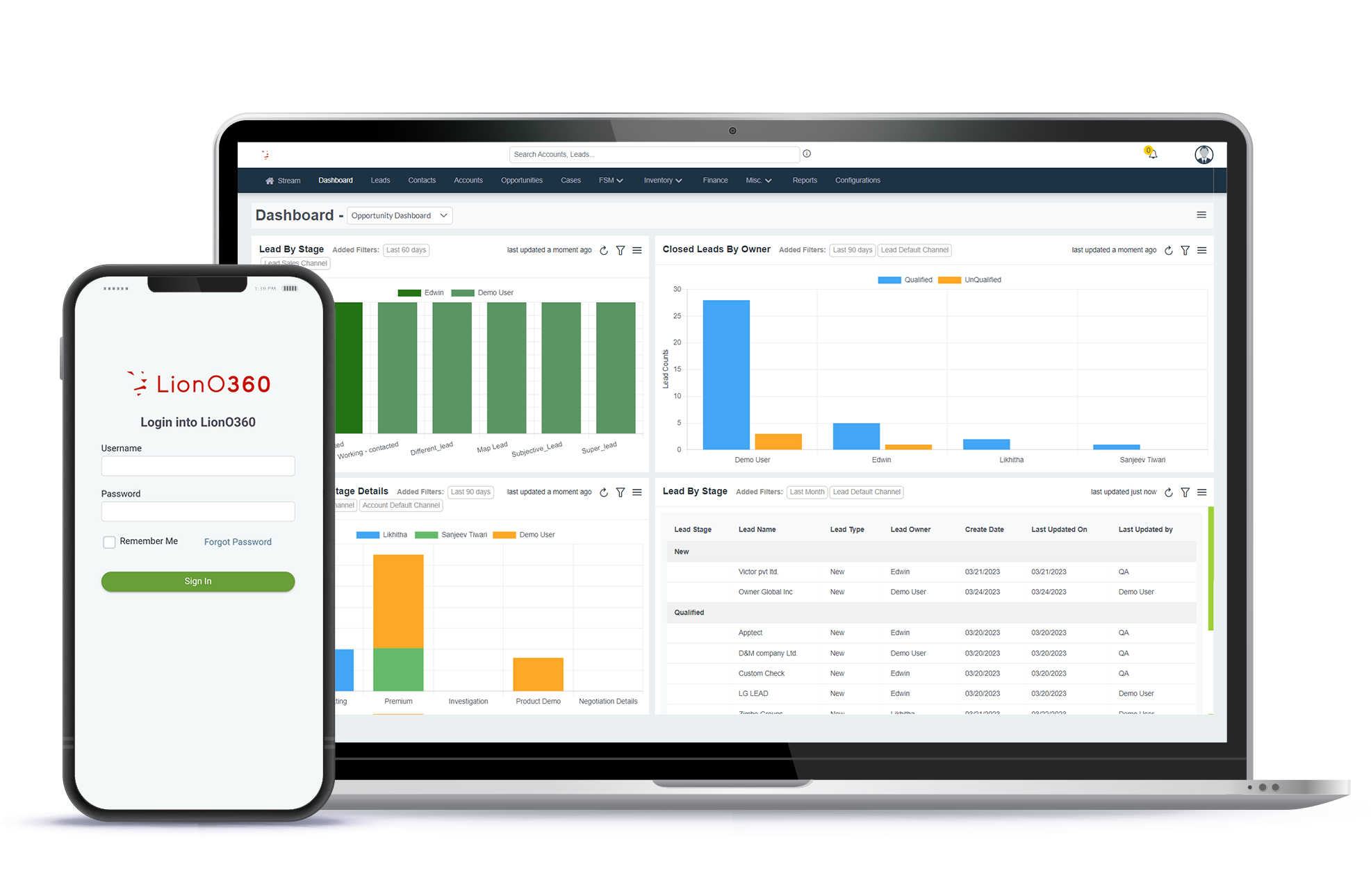
KPI in FSM is basically a measuring indicator that tells how the company is performing in terms of clarity, accountability, and direction. That is why Key Performance Indicators, more commonly known as KPIs, play an essential role.
KPIs in the field service management space can act as benchmarks that indicate whether operations are being done on time, whether clients are satisfied, and whether the business is making a return. Likewise, Field Service KPIs can help business leaders identify performance variances, make informed business decisions, and ensure that each service technician is maximizing each task within the limits. To think of this differently, you can think of KPIs as linking a day-to-day activity to the long-term vision.
Why Are KPIs Necessary for Your Business?
Field service management is not limited to dispatching technicians to customer sites. It involves multiple activities such as scheduling, maintaining equipment, handling customer complaints, tracking inventory, and ensuring timely billing.
It isn't easy to know what is working well and where improvements are required, without KPIs, as it brings transparency by providing real-time insights into operations. For example, measuring the average response time helps management understand if customers are being served promptly.
Here is why KPIs are necessary for the business, as they:
- Provide measurable data instead of assumptions.
- Help monitor customer expectations and satisfaction levels.
- Identify inefficiencies in processes and reduce wastage of time or resources.
- Strengthen financial performance through better planning and cost control.
- Empower teams by setting clear and achievable targets.
Types of KPIs that Works for FSM Software

KPIs in field service metrics can generally be divided up into four main categories. These include operational efficiency KPIs, customer experience KPIs, financial and business impact KPIs, and workforce and scheduling KPIs. Each category helps provide different insights about performance, but together they provide a whole performance map. Let’s start with all type of field service management KPI for 2025:
Operational Efficiency KPI
Operational efficiency KPIs focus on resources, such as time, workforce, and equipment, to deliver services. They are important for reducing delays, ensuring faster service delivery, and optimizing productivity.
Some of the key operational efficiency KPIs are:
- First-Time Fix Rate (FTFR): This shows the percentage of jobs resolved during the first visit without requiring follow-ups. A higher FTFR indicates that technicians are skilled, well-trained, and equipped with the right tools and spare parts.
- Average Response Time: This measures the time taken for a technician to reach the customer after a service request is logged. It is vital for customer trust and loyalty.
- Job Completion Rate: This reflects the proportion of service calls completed successfully within the planned timeframe.
- Utilization Rate: This shows how effectively the working hours of field technicians are being used.
Customer Experience KPIs
Customer satisfaction lies at the heart of field service management. Even the most efficient operations have little value if customers feel ignored or dissatisfied. Customer experience KPIs measure how well a business meets or exceeds customer expectations.
Some vital customer experience KPIs include:
- Customer Satisfaction Score (CSAT): This measures overall satisfaction with the service. Typically, customers are asked to rate their experience after service completion.
- Net Promoter Score (NPS): This indicates how likely customers are to recommend the company to others. A high NPS reflects trust and loyalty.
- Complaint Resolution Time: This shows how quickly customer grievances are resolved.
Financial and Business Impact KPIs
Every business decision eventually comes down to revenue and profitability. Financial and business impact KPIs provide insights into whether operations are creating value for the company. These KPIs also help in controlling costs and ensuring that growth is sustainable.
Some of the key financial KPIs are:
- Revenue per Job: This measures the average revenue generated from each service call. It helps in understanding which services contribute most to income.
- Cost per Job: This calculates the total cost of completing a service job, including travel and material expenses.
- Return on Investment (ROI): This indicates the financial return from investments in technology, training, or process improvements.
- Contract Renewal Rate: This shows how many customers renew their service contracts, reflecting the financial stability of long-term business relationships.
Workforce and Scheduling KPIs
The workforce is the most asset in field service management. Scheduling them effectively ensures timely service delivery, reduces downtime, and improves employee morale. Workforce and scheduling KPIs focus on how human resources are planned and managed.
Key workforce KPIs include:
- Technician Productivity: This measures the number of jobs completed by a technician within a given time.
- Schedule Adherence: This shows whether service appointments are being completed as per the planned schedule.
- Overtime Hours: This KPI reflects whether employees are overworked, which may lead to burnout or higher labor costs.
- Travel Time per Job: This tracks the amount of time technicians spend on travel, highlighting opportunities to optimize route planning.
LionO360 FSM: Track Your Field Teams Seamlessly

LionO360 FSM by LionOBytes is a top-field service software provider that simplifies and enhances the way businesses manage their service delivery operations. They provide a suite of solutions that come with advanced capabilities such as real-time tracking, automated scheduling, smart inventory management and tools to communicate with customers.
Here is the reason why LionO360 FSM is the first choice of leading businesses:
- It offers visibility into all aspects of service operations through detailed reporting and dashboards.
- It improves first-time fix rates by equipping technicians with the necessary data, parts, and customer history before they arrive at the site.
- It enhances customer satisfaction with features like instant updates, appointment reminders, and faster response times.
- It reduces operational costs by optimizing scheduling and travel routes.
- It provides business leaders with actionable insights for long-term growth and profitability.
Call us now or visit our website to book a free FSM demo.
Also Read: Measuring Key Performance Indicators in Field Service Management
Frequently Asked Questions
1. What are KPIs in field service management?
KPIs in field service management solutions are the indicators used to measure efficiency, quality, and impact of field operations. They help to evaluate performance in areas like response time, customer satisfaction, revenue, and workforce productivity.
2. Why are KPIs important in field service management?
KPIs are important because they provide data-driven insights that guide decision-making.
3. What are some examples of operational KPIs in field service management?
Examples of operational KPIs include first-time fix rate, average response time, job completion rate, and technician utilization rate. These indicators reflect the efficiency of day-to-day operations.
4. How do KPIs improve customer satisfaction in field service?
KPIs like customer satisfaction score, net promoter score, and complaint resolution time measure the quality of customer experience. Tracking these helps companies identify service gaps and take steps to deliver better customer care.







